US to boost troops protecting Syrian oil as Kurds start pullback
As Russian forces begin patrolling the flashpoint Syrian-Turkish frontier
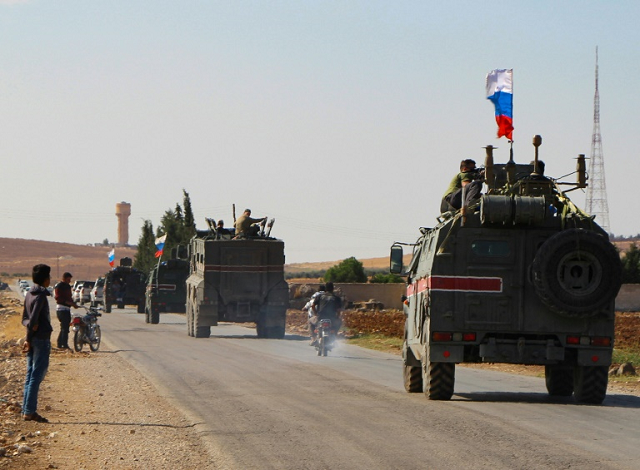
Russian forces have started patrols along the Syria-Turkey border, filling the vacuum left by a US troop withdrawal that effectively handed back a third of the country to the Moscow-backed regime of President Bashar al-Assad. PHOTO: AFP
"The US is committed to reinforcing our position, in coordination with our SDF (Syrian Democratic Forces) partners, in northeast Syria with additional military assets to prevent those oil fields from falling back to into the hands of ISIS or other destabilising actors," a Pentagon official said in a statement.
The official did not provide any numbers or confirm reports that US armoured assets would stay by the oilfields, once used to fund the militant Islamic State group's short-lived "caliphate".
Kurdish forces start Syria-Turkey border pullback
Russians launch military patrols
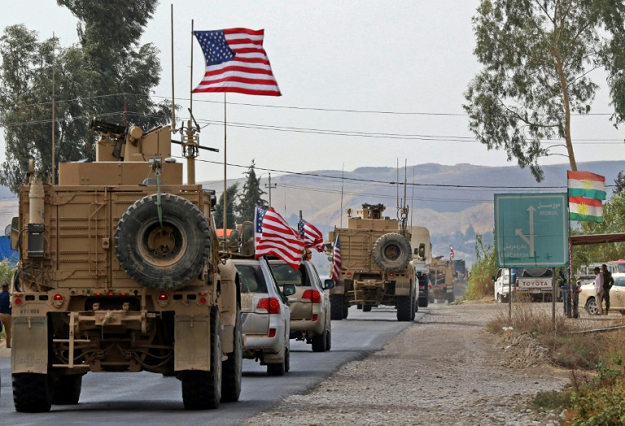 Russian-Turkish 'safe zone' in Syria. PHOTO: AFP
Russian-Turkish 'safe zone' in Syria. PHOTO: AFPThe announcement came as Russian forces began patrolling the flashpoint Syrian-Turkish frontier, filling part of the vacuum left by a US troop withdrawal that effectively returned a third of Syria to the Moscow-backed regime of President Bashar al-Assad.
An AFP correspondent saw a Russian patrol set off from Qamishli westwards along the border flying Russian flags.
The Russian defence ministry said the patrol covered "more than 60 kilometres" (37 miles) between Qamishli and Amuda.
The Syrian Observatory for Human Rights reported that the Kurdish-led SDF had pulled out of some areas at the eastern end of the border on Thursday.
Yet fighters from the Kurdish People's Protection Units (YPG) - the main component of the SDF - remained in many positions along the 440-kilometre border, said Observatory head Rami Abdel Rahman.
The Britain-based war monitor also reported clashes near the town of Tal Tamr between SDF fighters and some of the Syrian former freedom armies paid by Turkey to fight ground battles.
US backs Sochi deal
 Turkish soldiers patrol the Syrian border town of Tal Abyad, part of an Arab-majority strip along the frontier where Ankara will retain full control under the deal reached with Moscow. PHOTO: AFP
Turkish soldiers patrol the Syrian border town of Tal Abyad, part of an Arab-majority strip along the frontier where Ankara will retain full control under the deal reached with Moscow. PHOTO: AFPOn Tuesday Russia and Turkey signed a deal in the Black Sea resort of Sochi that promised a ceasefire while requiring Kurdish forces to withdraw to a line 30 kilometres from the border.
Turkish President Recep Tayyip Erdogan, who is embattled on the domestic political front, hopes to use the pocket to resettle at least half of the 3.6 million Syrian refugees his country hosts.
Under the Sochi deal, the area will remain under the full control of Turkey, unlike the rest of the projected buffer zone which will eventually be jointly patrolled by Turkey and Russia.
Turkey slammed at NATO meeting
 Syrian Kurds carrying photographs of loved ones killed in the Turkish offensive protest against the carve-up of their northeastern heartland by Ankara and Moscow. PHOTO: AFP
Syrian Kurds carrying photographs of loved ones killed in the Turkish offensive protest against the carve-up of their northeastern heartland by Ankara and Moscow. PHOTO: AFPAs Kurdish troops withdrew, SDF commander Mazloum Abdi on Twitter accused the Turkish-led forces of violating the truce on the eastern front of Ras al-Ain.
"The guarantors of the ceasefire must carry out their responsibilities to rein in the Turks," he said.
In spite of the Turks announcement of the END of military operations, they and their jihadists continue to VIOLATE and launch attacks on the eastern front of the Serêkaniyê.
— Mazloum Abdî مظلوم عبدي (@MazloumAbdi) October 24, 2019
The guarantors of the ceasefire must carry out their responsibilities to rein in the Turks.#SDF
NATO defence ministers slammed Turkey for its military operation in Syria on Thursday, at the start of a two-day meeting in Brussels.
German Defence Minister Annegret Kramp-Karrenbauer said she and her French and British counterparts believed the Turkish-Russian "safe zone" agreement "does not provide a permanent basis for a political solution".
US Defense Secretary Mark Esper, speaking at a think tank conference in Brussels before the NATO meeting, was more blunt, saying NATO member Turkey was "heading in the wrong direction".
"Turkey put us all in a very terrible situation and I think the incursion's unwarranted," Esper said.
Erdogan urges US to hand over SDF chief to Turkey
The Kurdish leader Abdi welcomed a German proposal of international troops being deployed to create a security zone in northeast Syria, but there was no indication the plan would be accepted by Turkey or UN Security Council member Russia - now the undisputed main foreign power in Syria.
US to protect oil
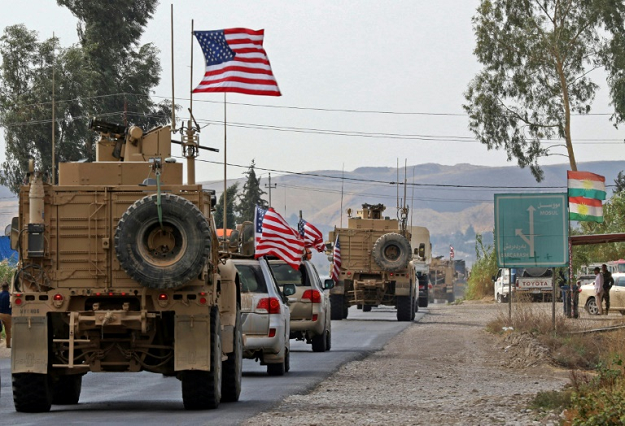 US troops have been pulling out of Syria for days but some forces remain in eastern districts, where government forces have been deploying but have not yet re-established full control. PHOTO: AFP
US troops have been pulling out of Syria for days but some forces remain in eastern districts, where government forces have been deploying but have not yet re-established full control. PHOTO: AFPWashington's insistence on maintaining a military presence in the oil fields in the country's far northeast corner, after abandoning other positions along the Turkish frontier, drew doubts and criticism.
But the Pentagon official, who insisted on anonymity, stressed it was to prevent a potentially resurgent Islamic State militant movement from retaking control of the fields.
"One of the most significant gains by the US and our partners in the fight against ISIS was gaining control of oil fields in Eastern Syria," the official said.
"We must deny ISIS this revenue stream to ensure there's no resurgence."



1726734110-0/BeFunky-collage-(10)1726734110-0-208x130.webp)
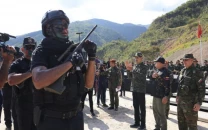
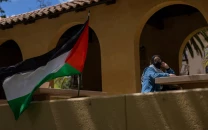













COMMENTS
Comments are moderated and generally will be posted if they are on-topic and not abusive.
For more information, please see our Comments FAQ